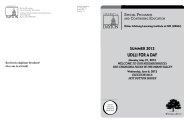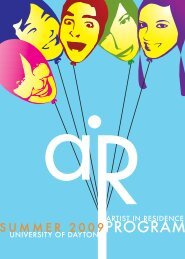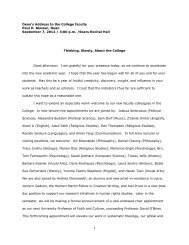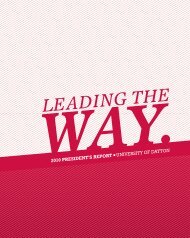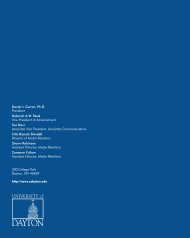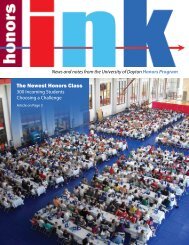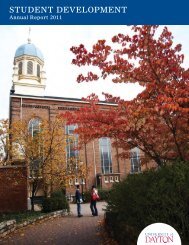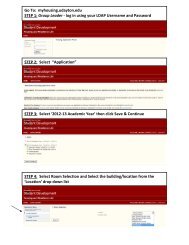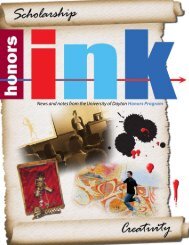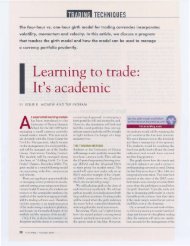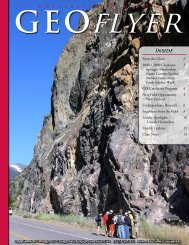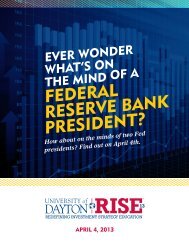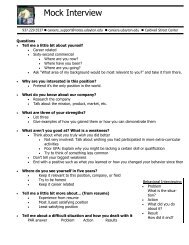Stander Symposium abstract book - University of Dayton
Stander Symposium abstract book - University of Dayton
Stander Symposium abstract book - University of Dayton
Create successful ePaper yourself
Turn your PDF publications into a flip-book with our unique Google optimized e-Paper software.
11:00 AM to 12:30 PM<br />
hope is that future teachers will be able to effectively identify gifted students within their classroom and better serve them. This paper explains<br />
there are many different definitions <strong>of</strong> giftedness, encompassing not only academic ability, but also creativity, task commitment, and leadership<br />
potential. Identification processes are shifting and future educators need to be prepared to identify students not purely in an academic sense, but<br />
in a multifaceted way.<br />
Effective Instructional Strategies For Use with Upper-Grade Level Struggling Readers<br />
Presenter(s): Claire M Shaw<br />
Advisor(s): Patricia M Hart<br />
Teacher Education - Course Project, 12_SP_EDT_498_H1<br />
This presentation will focus on struggling readers in upper level grades (9th through 12th). Most reading programs and research focus on literacy<br />
issues in elementary school. In many cases, reading instruction <strong>of</strong>ten ceases after eighth grade. After this point, teachers expect students to have<br />
a certain level <strong>of</strong> reading skill. Because <strong>of</strong> this, many students who struggle with reading will be mislabeled as having a learning disability.Unfortunately,<br />
recent studies have shown that a quarter <strong>of</strong> eighth-grade students perform below the “Basic” level <strong>of</strong> reading pr<strong>of</strong>iciency (Allington).<br />
Studies have also suggested that up to 70% <strong>of</strong> older readers are in need <strong>of</strong> remediation but do not receive it (Whithear). Because they lack reading<br />
skills, students cannot perform well in other classes, even in subjects like math and science where they may be capable <strong>of</strong> grasping the concept<br />
but cannot read the assignments or questions. Struggling readers cannot keep up with increasingly advanced language, and <strong>of</strong>ten drop out in<br />
high school and become adults without pr<strong>of</strong>icient reading skills.The focus for the <strong>Stander</strong> presentation will be on Chapter 2, the Review <strong>of</strong> the<br />
Literature for this research study. The review will focus on articles about struggling readers in urban and high-poverty schools. It will also focus on<br />
the most effective strategies teachers can employ to help students become pr<strong>of</strong>icient readers. Evidence based strategies that have been identified<br />
as effective will be examined. The impact <strong>of</strong> implementing these strategies in schools will be an outgrowth <strong>of</strong> the study. BibliograhyAllington,<br />
R.L. (2011). Reading intervention in the middle grades. Voices from the Middle, 19(2), 10-16.Whithear, J. (2011). A review <strong>of</strong> fluency research and<br />
practices for struggling readers in secondary school. Literacy Learning: The Middle Years, 19(1), 18-28.<br />
English Language Learners<br />
Presenter(s): Maria C Roth<br />
Advisor(s): Patricia M Hart<br />
Teacher Education - Course Project, 11_FA_EDT_110_P1<br />
Current research shows that the number <strong>of</strong> English Language Learners in America is steadily increasing. This paper explains some approaches that<br />
are effective in teaching English Language Learners. These approaches include teachers using visual aids in their lesson plans, integrating their<br />
home cultures into their class, being patient with them, and work with them outside <strong>of</strong> class. This paper includes aspects from each approach in<br />
great detail. All <strong>of</strong> these approaches contribute to the success <strong>of</strong> English Language Learners in the classroom.What is the best approach for teaching<br />
English Language Learners?<br />
Highly Effective Teaching Strategies That Impact Low Achieving Mathematics Classrooms<br />
Presenter(s): Erin M Yacovoni<br />
Advisor(s): Patricia M Hart<br />
Teacher Education - Course Project, 12_SP_EDT_498_H1<br />
This research study will look at the importance <strong>of</strong> teachers using particular instructional strategies and their impact on student learning, within<br />
a low achieving high poverty mathematics classroom. Dr. Deborah Ball, the dean <strong>of</strong> the School <strong>of</strong> Education at the <strong>University</strong> <strong>of</strong> Michigan, uses<br />
the term “high-leverage practices”. This term is defined as “those practices at the heart <strong>of</strong> the work <strong>of</strong> teaching that are most likely to affect<br />
student learning” (Ball, 2010/2011). The study would include looking at these terms used for these practices, and reviewing the effectiveness <strong>of</strong><br />
these practices. In looking at the ways teachers instruct their classroom, the study will review the literature on the pr<strong>of</strong>essional development <strong>of</strong><br />
preservice and inservice teachers in learning these strategies. The study will examine the emphasis made during the pr<strong>of</strong>essional development<br />
<strong>of</strong> teachers on the connection between instructional practices and student learning. This research may result in teachers being encouraged to use<br />
these research based methods in their classrooms. The achievement gap will be considered as part <strong>of</strong> this research study.Bibliography:Ball, D. L.<br />
(2010/ 2011). Teaching skillful teaching. The Effective Educator, 68(4), 40-45.<br />
98




